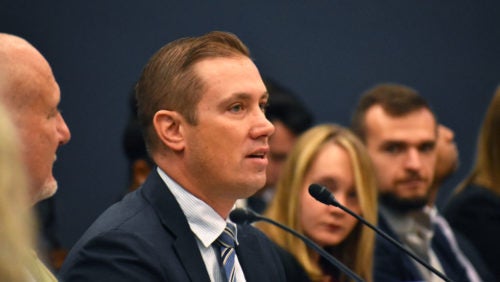On the Hill: Professor Shon Hopwood Advocates for Entrepreneurship for Ex-Offenders
November 13, 2019

Professor Shon Hopwood testified on the Hill in October regarding "Prison to Proprietorship: Entrepreneurship Opportunities for the Formerly Incarcerated."
“I committed a violent crime. But I am not a violent criminal.”
That’s part of the standard introduction offered by Georgetown Law Professor Shon Hopwood ― who as a young man was convicted of bank robbery and spent more than a decade in federal prison.
Hopwood recently testified on reintegrating ex-convicts into society during a congressional hearing of the House Committee on Small Business in October titled “Prison to Proprietorship: Entrepreneurship Opportunities for the Formerly Incarcerated,” which was held at the Rayburn House Office Building, in Washington.
Hopwood studied the law in prison, going so far as to get two cert petitions granted by the U.S. Supreme Court. After his 2009 release, he earned a J.D. as a Gates Public Service Law Scholar at the University of Washington School of Law before clerking for Judge Janice Rogers Brown of the U.S. Court of Appeals for the District of Columbia Circuit.
Today, he’s an appellate lawyer and an associate professor of law at Georgetown Law. But on the Hill, Hopwood discussed his presumptions concerning his acceptance by society, as well as his employment prospects, upon his re-entry.
What he found was that having served his sentence didn’t matter to society, and that ex-offenders struggle to obtain affordable housing and stable employment, especially since many lack education. Those barriers often lead to more offenses and repeated trips down that same path “95 percent” of the time, he said.
Hopwood feels the passing of the entrepreneurship bill would address the unemployment issue, since the rate of ex-convicts is “five times higher” than that of the average American.
“For many people that come out, particularly those who have committed violent offenses and sex offenses, entrepreneurship is the only way for them to get gainful employment,” he said, “and so because this bill will get at that particular problem, I encourage [Congress] to pass this into law.”
Hopwood offered his appreciation for the passing of the First Step Act, which gives non-violent offenders a chance to reenter society. Calling it “still quite modest reform,” he added, “It’s the best criminal justice reform bill to come out of Congress in my lifetime.”
Still, “we need so much more” to reduce the recidivism rate of the “600,000 people” coming out of American prisons each year, he said.
Character is not static, he said. “People change and the law should recognize this and we should be in the business of giving second chances to people coming out of prison.”